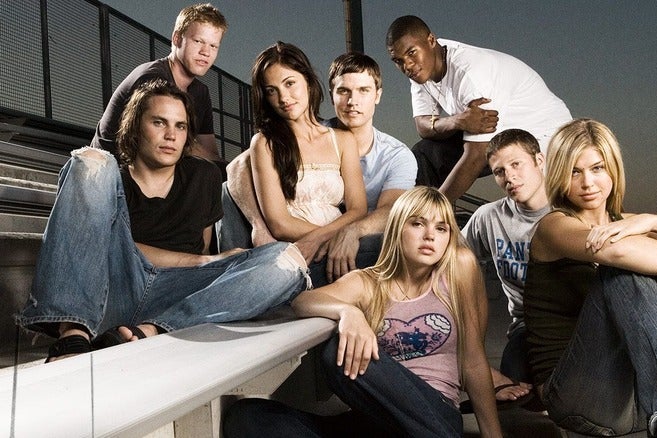Your correspondent finds himself at full grovel, crawling toward Nielsen households, begging that they flip on Friday Night Lights (NBC, Tuesdays, 8 p.m. ET). The show is terrific—the most engrossing new drama of the fall season—but it’s also the worst-rated, and that’s just not fair.
Adapted by Peter Berg from his own film adaptation of H.G. Bissinger’s book, Friday Night Lights is about high-school football in small-town Texas, which is what seems to be the problem; conventional wisdom states that TV dramas welded from gridiron are tough to sell. But intimate knowledge of football is not a prerequisite for enjoying FNL. (For one thing, there are cheerleaders to cue you to feel proud or tense or on the edge of heartbreak.) If you understand that a touchdown is worth six points and have a rough idea of how many feet are in a yard, you should be able to follow the show. If you’re interested in thoughtful, low-key riffs on community, Christianity, and youth culture in America, you should love it. And if you’re into good old-fashioned violence, you’ll be psyched.
Let’s get you caught up: The series, which debuted last week, begins with glances at the West Texas skyline, at telephone poles and stadium lights, at power line towers that dream about being oil derricks. Coach Eric Taylor (Kyle Chandler), the strategically taciturn type, walks the field at Dillon High School. It’s the eve of his first season as head coach. “Who wants to talk Panther football?” asks a man on a car radio. The Panthers are entering the season ranked No. 1 in the state. Everyone in Dillon wants to talk Panther football; what would be the point of talking about anything else? The AM yammering recalls the drone of the PA in Robert Altman’s M*A*S*H, just as the show’s layered dialogue recalls that movie’s anxious chatter.
The heart of the pilot was a wrenching passage that involved paramedics carrying Dillon’s quarterback, Jason Street (Scott Porter), off the field, his spine damaged but his beautiful manners, like his Clark Kent face, intact. Jason may never walk again, and until he does, I’ll be on the lookout for tremendously effective pathos coming from his direction—more stuff along the lines of the scene in which Jason, his head immobilized, delivers a pep talk to his coach. Or the shot of his cheerleader girlfriend feeding him a cookie. In Dillon, food has a Southern sort of social importance, of course. It’s a place where women bake things and men eat them; where the coach’s wife somehow finds herself agreeing to make 200 Rice Krispies Treats fast.
With Street sidelined, the Panthers’ leadership has fallen to their second-string QB, Matt Saracen (Zach Gilford), and to their star running back, Brian “Smash” Williams (Gaius Charles). Saracen, who listens to Bob Dylan and whose father is in Iraq, is scrawny and intuitive. Smash has a lot of charisma, and you’re never quite sure whether he’s about to use it to heave a boast, say a prayer, rouse the team, or spit game at the honeys. Imagine Muhammad Ali, but a bit less shy and uptight. Smash has lately been hanging out with, or at least near, Tyra Collette (Adrianne Palicki), the nominal girlfriend of his teammate Tim Riggins (Taylor Kitsch). Tyra has a darling mole between her eyebrows, several excellent pairs of jeans, and a complete mastery of mean-girl style. Riggins is hunkily dissipated, but you know he must be sensitive behind that mess of hair and all that pout. When, not eight minutes into the pilot, coach Taylor catches Riggins drunk at practice, the coach disciplines him to the brink of hazing, which looks exciting and feels just.
It’s impossible to root against coach Taylor. He’s thoroughly decent and totally put upon. He hears free advice every time he turns on the radio, then he goes to a boosters’ lunch at Applebee’s, where he hears more of it from the mayor, who combines Ann Richards’ looks with LBJ’s mannerisms. Coach lives in a place where leading citizens offer such exhortations as, “This is about tradition. … It’s about spirit and keepin’ this town alive. … It’s all we got,” and it doesn’t sound phony. And then he gets home, where his wife wants both a job at the school and his-and-her closets. His loving daughter, a teenage intellectual with bangs, sits there with a novel in her hand and calls him Captain Ahab, “driven to capture what may be uncapturable.”
I wish I could say that NBC is as good as Herman Melville. That’d be stretching it. Still, Friday Night Lights and Moby-Dick share a few major themes—masculinity, passion, anticipation—and each of them is bouncing with virtuosity. It would be great fun if FNL made it through damp, drizzly November.
